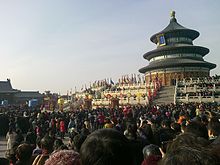Shangdi
Shangdi (Chinese: 上帝; pinyin: Shàngdì; Wade–Giles: Shang Ti), also written simply, "Emperor" (Chinese: 帝; pinyin: Dì), is a Chinese word for god.[1]

Although the name has shang in it, it is a different word in Chinese from Shang dynasty and has a different tone.
In Chinese religion Tian is usually used to refer to God. But "Shangdi" is used by some groups,[2] including some Confucian philosophers,[3] and Protestant Christianity.[4]
Etymology
change
"Shang Di" is the pinyin romanization of two Chinese characters. The first – 上, Shàng – means "highest" and "first"; the second – 帝, Dì – refers to the High God of Shang, thus means "deity" (manifested god), .[2] Thus, the name Shangdi should be translated as "Highest Deity", but also has the implied meaning of "Primordial Deity" or "First Deity" in Classical Chinese. In the ancient books the shangdi is described with humanlike traits. He is also associated with the North Star.[5]
Related pages
changeReferences
change- ↑ Lagerwey, John; Kalinowski, Marc (2008-12-24). Early Chinese Religion: Part One: Shang Through Han (1250 BC-220 AD) (2 Vols). BRILL. ISBN 978-90-04-16835-0.
- ↑ 2.0 2.1 http://www.sino-platonic.org/complete/spp108_chinese_deity_heaven.pdf
- ↑ Huang, Yong. "(2007b) Confucian Theology: Three Models".
{{cite journal}}: Cite journal requires|journal=(help) - ↑ 放映週報 (23 April 2016). 《死期大公開》上帝一家難念的經 - The News Lens 關鍵評論網. thenewslens.com.[permanent dead link]
- ↑ Clemen, Carl (2005). Religions of the World:Their Nature and their History. New Delhi: Cosmos Publications. ISBN 81-7755-927-3.